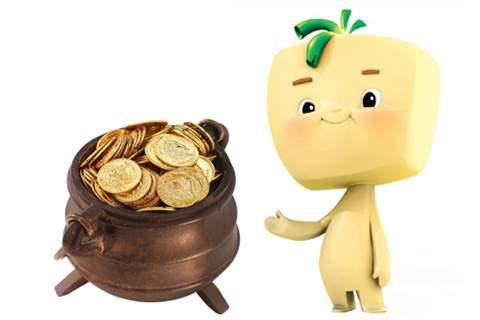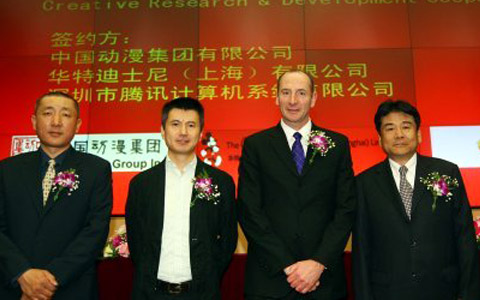Stephanie Ho for Voice of America
BEIJING – Popular western movies like “Kung Fu Panda” are presenting a challenge for Chinese animators, who have yet to produce a hit among international audiences. But for… (full article & video)
Stephanie Ho for Voice of America
BEIJING – Popular western movies like “Kung Fu Panda” are presenting a challenge for Chinese animators, who have yet to produce a hit among international audiences. But for… (full article & video)
Comments Off on Hopes of Chinese Animation Ride on “Tofu Boy”
Posted in News
Tagged China, Chinese animation, Kevin Geiger, Kung Fu Panda, Legend of a Rabbit, Magic Dumpling, Magic Dumpling Entertainment, Pinocchio, Sun Lijun, Tofu Boy, Walt Disney Company

As reported by Clifford Coonan in Variety…
At the government level, animation is generally regarded as a growth industry, initially approached like any other domestic manufacturing endeavor, but now viewed as a means of extending China’s soft power internationally,” says Kevin Geiger, a former Disney CG supervisor and co-founder of Beijing-based Magic Dumpling and who has advised the Chinese government on its toon policy. “At the investor level, there is a ‘gold rush’ mentality towards animation.”
Magic Dumpling is working on “Dr. Sun,” an animated feature about historical icon Sun Yat-sen, that’s a Taiwan-China co-production. The company is also developing the “Tofu Boy” transmedia franchise, centered on a feature-length toon that is part Pinocchio and part SpongeBob…
Comments Off on China’s Animation Gold Rush
Posted in News
Tagged Annecy, China, China International Cartoon & Animation Festival, Chinese animation, CICAF, Clifford Coonan, Dr. Sun, DreamWorks, Jin Delong, Kevin Geiger, Legend of a Rabbit, Magic Dumpling, Magic Dumpling Entertainment, Pinocchio, SARFT, Shanghai Media Group, State Administration of Radio Film & Television, Sun Lijun, Sun Yat-sen, Tofu Boy, Variety
Magic Dumpling Entertainment President & CEO Kevin Geiger and Head of Development Wen Feng delivered three full days of seminars at Toonmax Media Company, Ltd. on topics ranging from animation development, production, distribution, marketing and transmedia.
Comments Off on Shanghai Seminars
Posted in Announcement
Tagged animation development, animation distribution, animation marketing, animation production, animation transmedia, China, Chinese animation, Kevin Geiger, Magic Dumpling, Magic Dumpling Entertainment, Shanghai, Toonmax, transmedia, Wen Feng

On the heels of the “Oriental DreamWorks” announcement, The Walt Disney Company announced a joint venture with the China Animation Group and leading internet service provider Tencent, as widely reported in the press this week:
The Walt Disney Company in China, the Ministry of Culture’s China Animation Group, and Tencent, China’s largest internet service provider, have formed a partnership, “The National Animation Creative Research and Development Cooperation,” to advance the country’s animation industry. The organization, announced at a signing ceremony in Beijing today (Tuesday), will serve as an incubator to train local talent and develop original content that will entertain audiences in China and worldwide.
“The National Animation Creative Research and Development initiative is focused on nurturing local talent and recognizes the importance of developing original local animation content,” said Andy Bird, Chairman of Walt Disney International. “Disney’s involvement builds on our expertise and long term commitment to nurture the local original animation industry. As founding partner we look forward to working with this new creative partnership in creating content for the Chinese and international marketplace,” he added.
Mr. Bird was joined at the ceremony by Liang Gang, Chairman of the Board for China Animation Group, Ren Yuxin, a senior executive of Tencent, and Gao Zheng, deputy director general, Cultural Industry Department for the Ministry of Culture.
As part of the initiative, Disney will provide its expertise in storytelling from concept creation and story development to market research. Disney will work with the China Animation Group and Tencent to foster local content across mediums, including television, motion pictures and digital platforms, for distribution in China and internationally. Tencent, one of China’s largest Internet service portals, will provide online marketing support.
Comments Off on Big Fish
Posted in News
Tagged Andy Bird, China, China Animation Group, Chinese animation, Disney, DreamWorks, Gao Zheng, Liang Gang, Ministry of Culture, Oriental DreamWorks, Ren Yuxin, Tencent, The Walt Disney Company, Walt Disney International

The “Tofu Boy” cast had a pleasant and productive outing at MIPTV 2012. As at Filmart in Hong Kong, China was on the forefront of many minds in Cannes.
Comments Off on Canned Tofu
Posted in Announcement
Tagged Cannes, China, Chinese animation, Filmart, Hong Kong, Magic Dumpling, MIPTV, Tofu Boy

Magic Dumpling Entertainment President & CEO Kevin Geiger speaks on the challenges and opportunities facing animation producers in China and around the world in the MIPTV special edition of C21 Media’s “Insider’s Guide to Animation”.
Comments Off on Animation Insider
Posted in Information
Tagged animation, C21, China, Chinese animation, Kevin Geiger, Magic Dumpling, Magic Dumpling Entertainment, MIPTV, Tofu Boy

As reported by Jonathan Landreth in The Wall Street Journal…
The world’s second-largest economy has never produced its own version of Pokémon or Buzz Lightyear. Could the solution be a bean-curd-based riff on Pinocchio?
Cue “Tofu Boy,” a $5 million film slated for fall 2014 release, whose makers hope the character whets the world’s appetite for Chinese animation.
“We’re creating Chinese-themed content with international resonance,” says Kevin Geiger, a Walt Disney Animation veteran who now heads a Beijing-based start-up studio, Magic Dumpling Entertainment. “Tofu Boy” is “inspired by but not based on” the Pinocchio story, he says. “A good little boy who’s a bit mischievous is something every parent in the world can relate to.”
He and his partners, director Sun Lijun, scriptwriter Yan Yi and chief creative officer Feng Wen, began work on “Tofu Boy” in 2009 and now share digital sketches on their iPads with coffee-shop patrons, solicit plot feedback from neighborhood kids, and grill distributors who claim to know local moviegoers best.
“We’re trying to give Chinese audiences a sense of ownership,” Mr. Geiger says. “They’re so tired of period pieces, but people are reluctant to do something modern because it sometimes bumps up against the censors. It’s safer to do something set in the past. But Pixar tells movies about now. ‘Toy Story’ is set today.‘Wall-E’ is set in the future. Why can’t Chinese animation be the same? If we can create content that Chinese feel they own, but that also has an international-quality story and design, then it can do well overseas.”
First it must resonate with Chinese audiences. Mr. Sun, the head of the animation department at the Beijing Film Academy and director of the animated movie “Legend of a Rabbit,” helped play up Tofu Boy’s culturally Chinese aspects. “His notes always incorporate something traditional,” Mr. Yan says.
Tofu Boy comes to life in modern-day Shanghai, in a once-famous but now bedraggled shop where tofu maker Old Wang wonders aloud if having a son would change his life. As for his powers, the animators take advantage of his soy-based nature by giving him the ability to change shape and texture—Mr. Sun told the animators to make him “all consistencies,” Mr. Geiger says. He hardens to pound a nail and transforms into stinky tofu when upset.
There are also occasional nods to more Western sensibilities. One character, regarding Old Wang, says “There are born winners and born losers, and that’s an example of a born loser,” but is countered by another who says, “There’s not only fate and destiny, there’s hope.”
“Kung Fu Panda” was a hit in China because, Ms. Feng says, “in the end, it was about needing to find your own way—not a part of Chinese culture, but a philosophy young Chinese fantasize about.”
This mix of local and potentially global appeal is crucial to the success of “Tofu Boy” and other animation projects in development in China. The country is eager to promote its culture abroad. According to the State Administration of Radio, Film and Television, China’s 2011 box-office revenue was up 29% from a year earlier, to 13.1 billion yuan ($2.1 billion) though U.S. Hollywood productions still draw the most moviegoers. Other animated series, such as “Pleasant Goat and Big Big Wolf,” are popular within China and other Asian markets but haven’t yet crossed over.
Magic Dumpling is hopeful but realistic. “Can we really draw more than 10 versions of a character and choose the best one?” Ms. Feng says. “Chinese artists are not used to even this simple process. We’re trying to build a good Chinese film step by step. We’re trying to take Chinese culture overseas. In reality, it will be a very slow process.”
Comments Off on Chinese Animators Chase A Character Of Their Own
Posted in News
Tagged Beijing Film Academy, Buzz Lightyear, China, Chinese animation, Disney, DreamWorks, Film & Television, Jonathan Landreth, Kevin Geiger, Kung Fun Panda, Legend of a Rabbit, Magic Dumpling, Magic Dumpling Entertainment, Pinocchio, Pixar, Pleasant Goat and Big Big Wolf, Pokemon, State Adminstration of Radio, Sun Lijun, Tofu Boy, Toy Story, Wall Street Journal, Wall-E, Wen Feng

Magic Dumpling President & CEO was pleased to contribute to two properties on the Hong Kong Filmart trade show floor: as consultant to China’s first animated 3D stereoscopic feature film “Legend of a Rabbit”, and as producer with partner Steven Ching (Agogo Corporation) on China’s next hot property: “Tofu Boy”.
Comments Off on Present & Future Legends
Posted in Announcement
Tagged 3D animation, Agogo, Agogo Corporation, Chinese animation, Filmart, Hong Kong, Kevin Geiger, Legend of a Rabbit, Magic Dumpling, Magic Dumpling Entertainment, stereoscopic animation, Steven Ching, Tofu Boy

As reported by Clifford Coonan in Variety…
HONG KONG — China’s growing economic might is attracting a lot of interest from Hollywood and the rise of the country is one of the top themes at Filmart, the annual Hong Kong Intl. Film and TV Market.
One exec who has been fielding questions is producer Kevin Geiger, a former CG supervisor at Walt Disney and co-founder of Magic Dumpling, a Beijing-based animation company.
“In the last few years the fact that we work in China has made us a subject of interest. People want to talk further,” he said.
With B.O. gross passing $2 billion for the first time last year and forecast to top $5 billion by 2015, China will soon become the world’s second largest movie market.
“Hollywood needs to tell the same story in new and unusual ways and right now China is hot, it’s interesting and most people in the West don’t know very much about it,” Glenn Berger, DreamWorks Animation producer and scribe of the “Kung Fu Panda” movies, told a Filmart panel on Tuesday.
Producer Tracey Trench said, “I know studio executives and even chairmen of studios who’ve never been to China, who are now saying: I need to go, I need to meet people.”
Some of the biggest names in Hollywood have a significant presence in China, including the big studios and prominent indies including Legendary, Relativity and Village Roadshow.
Asia is also attractive because of its low costs.
“You already know (filming) is costing you a ton of money, so you try to figure out every way possible to hedge that financial risk,” Trench said.
The four-day Filmart event at the Hong Kong convention center closes Thursday.
Comments Off on Filmart Mulls Hollywood-China Relationship
Posted in News
Tagged China, Clifford Coonan, DreamWorks, Filmart, Glenn Berger, Hollywood, Hong Kong, Kevin Geiger, Kung Fu Panda, Magic Dumpling, Magic Dumpling Entertainment, Tracey Trench, Variety

Amid a rising tide of excitement among aspiring Chinese animation artists regarding the future of China’s media industry, Magic Dumpling President & CEO Kevin Geiger gave a series of lectures in Zhengzhou at the Huayu Brothers Animation School, the Zhengzhou University of Light Industry School of Art & Design, and the Zhengzhou Institute of Science & Technology.
The Huayu Brothers “Buddy” animation experience zone is up and running, complete with areas for children to participate in 2D, 3D, stop-motion and live-action filmmaking, as well as audio recording and post-production.
Comments Off on Gung Ho In Zhengzhou
Posted in Announcement
Tagged China, Chinese animation, Huayu Brothers Animation School, Kevin Geiger, Magic Dumpling, Magic Dumpling Entertainment, Zhengzhou, Zhengzhou Institute of Science & Technology, Zhengzhou University of Light Industry
You must be logged in to post a comment.